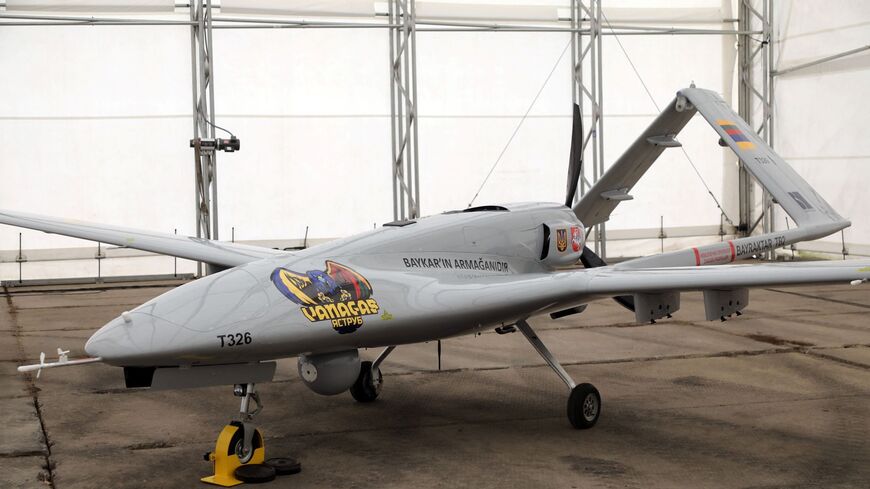In his visit to the Gulf this week, Turkish President Recep Tayyip Erdogan scored what was described as the largest defense deal in his country’s history.
The stakes were high for the president desperately looking to direct more foreign investment into his country, beset by financial difficulties and hampered by sky-high inflation.
But when Erdogan visited Saudi Arabia on Tuesday, Baykar, an Istanbul-based defense firm owned by the family of the president’s youngest son-in-law, announced that it would sell an unspecified number of Bayaraktar Akinci high-altitude long-endurance (HALE) drones to the kingdom.
Here, there, everywhere
Since Turkey started selling Baykar drones in 2019, the weapons have been used in conflict zones all over the world, including Ukraine, Nagorno-Karabakh, Libya, Syria, Iraq, Ethiopia and Somalia.
So far, 29 countries have purchased Turkish-made drones, while four are in negotiations and seven others have publicly expressed interest in acquiring them, according to the Washington Institute for Near East Policy. Turkey has also explored unmanned aerial vehicle (UAV) agreements with several countries including Saudi, Ukraine and Kazakhstan.
Kuwait, Qatar, the United Arab Emirates, Algeria, Morocco and Iraq are among the countries in the Middle East and North Africa that purchased Bayraktar TB2 drones, the most popular type.
Rich Outzen, a nonresident senior fellow at the Atlantic Council in Turkey, said that there are several reasons for the success and popularity of Bayraktar drones.
The Turks "don't just deliver the aircraft with a quick users' course,” Outzen told Al-Monitor. “They provide long-term training teams, maintenance and supply support, and operational integration with other systems — command and control, other sensors, manned and unmanned ground and air forces."
Second, he said, Turkish forces have recent combat experience with the drones, "so their concepts and integrating approach have recency (and brand recognition).”
He added that Turkish drones are generally cheaper that US and other Western-made drones, and superior to other non-Western systems, such as UAVs made in China or in Iran.
Peter Wilson, a senior defense policy analyst at RAND corporation, said Bayraktar drones are "combat proven, lower cost, and have no strings attached.”
Saudis' Akinci agreement
The Saudi deal is “extremely significant,” Outzen said. “Akinci was fielded to Turkish forces just last year, and Saudi Arabia will be just the third country besides Turkey to receive them. The Akinci can strike distant targets with precision munitions, including targets designated by other, smaller drones. For potential naval or littoral warfare in the Gulf, this is an important capability.”
Kirsten Fontenrose, president at Red-Six International, a global UAV pilot services provider, said that the Akinci is nearly twice as large as the TB2.
“The Akinci is more equivalent to a Predator. The Akinci will be useful as a surveillance platform but I would think it is vulnerable to surface-to-air missiles, which the Houthis have,” she told Al-Monitor, noting that the Iran-backed rebels in Yemen have brought down Chinese-made CH4 drones which are in the same weight class.
She said that if the Akincis are for surveillance, "they can fly beyond the range of Houthi SAMs (surface to area missiles). If their intent is to eventually arm them with ATGMs (anti-tank guided missiles) on wing hardpoints, it will depend on the range of the ATGM."
It would be a good aircraft for internal security, Fontenrose said, as the Saudi air force can overfly the desert for very long periods of time and patrol the Red Sea.
Wilson added that a major investment in combat drones and long-range precision-guided cruise and ballistic missiles makes sense for the kingdom, because "deep aerial strikes are possible without putting reluctant pilots at risk."
He said it suggests that the Saudis' massive investment in a large fleet of manned fighter bombers was a misallocation of resources, and that the decision to buy weapons from Ankara was a sign of the increasing geostrategic realism in the Middle East.
Further Gulf customers
As the weapons grow even more popular, Wilson said that other Gulf states could be buying them in the near future.
Outzen said the TB2 has been used by dozens of countries, including to great effect in the early days of the Ukraine war.
“The number of countries who need the Akincis may be somewhat lower," he said, "but should still number in the dozens within a year or two. Pakistan and Libya already have them. The Emirates and Qatar may be candidates, Azerbaijan already is. Indonesia and Bangladesh reportedly are interested as well.”








